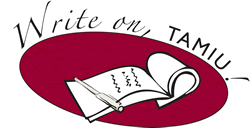
So…Got QEP?
If you are a student or plan to be a student at Texas A&M International University, you will definitely get QEP.
So what is QEP? QEP stands for Quality Enhancement Plan and is TAMIU’s plan to improve undergraduate writing. The QEP will be used during the “Write On, TAMIU” campaign, which promises to prepare students for success in their personal and professional lives by embracing the art and style of composition — writing.
“We want to create a campus culture of writing so that writing is not merely something that is part of English classes or even in class. It’s part of a culture of writing that across campus, people write. There are many forms of writing. It’s not just about essay or term paper writing. There are many different types of writing that go on daily,” said Dr. Jeffrey Cass, Associate Provost.
If you’re wondering why this is important, consider that by enhancing the quality of your writing, you will be able to communicate clearly and effectively when you e-mail your family, write a memo at work or even send a sick note to your child’s teacher. Clear and effective writing is also necessary to write a cover letter or a letter of application.
“Whether you’re applying for a job, writing a resume or a memo, whatever it is, that’s writing too. All the rules apply. It has to make sense. It has to be focused. It has to be relatively error free. All those things are important to all levels. We want to create a campus culture of writing.
“We are now undergoing the Southern Association of Colleges and Schools (SACS) (http://www.tamiu.edu/sacs/) accreditation process. It’s something the University goes through every ten years. Part of it involves a compliance audit, but the other piece, a large piece, is the QEP,” added Dr. Cass.
One of the goals of the QEP is to increase the pass rate on the University Writing Assessment. Currently, the first-time pass rate is 60 percent and for re-testers it’s only 40 percent. The QEP strives to increase those numbers to 70 percent and 60 percent over the next five years.
Many University faculty members are involved with the implementation of the QEP. Dr. Cass explained that the faculty group, Scholars’ Alliance for Learning and Teaching (SALT), will focus on increasing the number of short writing assignments in classes across all disciplines. On the National Survey for Student Engagement (NSSE), students indicated that they wrote few short writing assignments. The Scholars’ Alliance attempts to redress this deficiency.
“If they aren’t getting any short writing assignments in any of the fields, not just English, but anywhere, students aren’t just going to have problems there. They also have problems making the transition to longer writing projects or other kinds of writing projects within their own disciplines,” said Cass.
But the Plan isn’t limited to the University. Another goal emphasizes excellence throughout the community. TAMIU will gauge area employers’ satisfaction with TAMIU graduates. The QEP goal is to have 80 percent of employers express satisfaction with graduates’ writing skills.
One of the most important professional goals is to make the findings of the QEP available online. By sharing what works best at TAMIU, other academic communities may improve the education of their students in their institutions.
“This is something we’ve been working on for a couple of years and students should be aware that there is a lot of information online on the QEP. Students need to be involved in this. Obviously, we had to write it, but they are the ones who are going to be affected because it’s all about how well they are learning how to write and how writing affects what they are doing in their programs and finally in their careers,” acknowledged Dr. Cass, “We need the students involved. Without them, it’s not going to work.”
For more information visit http://qep.tamiu.edu or contact Dr. Cass at 326.2601, visit offices in the Sue and Radcliffe Killam Library room 255C or e-mail qep@tamiu.edu.
University offices hours are 8 a.m. to 5 p.m., Monday through Friday.